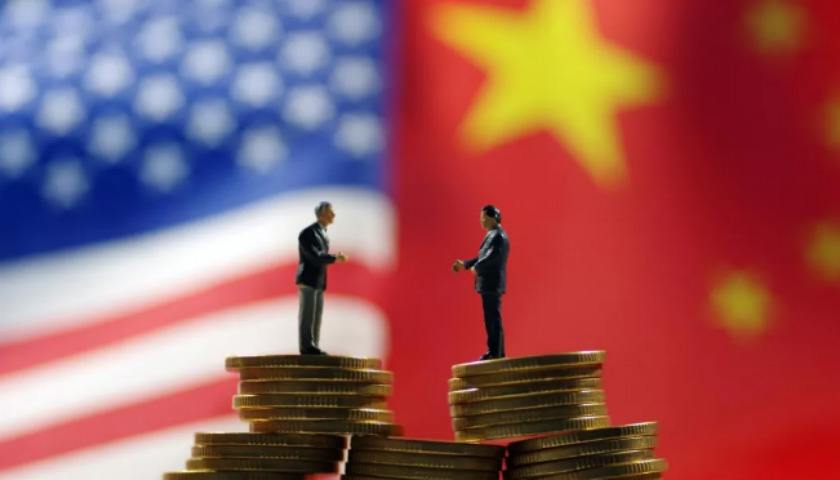A battle of wills betweent he U.S. and China
中美之間的一場意志較量
One year ago, President Trump welcomed China’s Xi Jinping to his Mar-a-Lago estate.
一年前,特朗普總統在他的馬阿拉戈莊園對中國主席習近平致以了熱烈的歡迎。
Despite predictions that diferent temperaments would make for an uneasy encounter,
盡管當時有預言說性格差異會讓兩人的相遇并不那么愉快,
the meeting helped the nations work closely on North Korea and avoid a trade conflict.
但那次會議還是促進了兩國在朝鮮問題上的密切合作,避免了一場貿易沖突的爆發。
Still, this is an election year in the U.S.,
盡管如此,今年到底是美國的選舉年,
and Trump wants supporters to see that he’s keeping his promises to get tough on China and trade deficits.
所以,特朗普想讓自己的支持者們看到他兌現了自己的承諾,對中國,對貿易逆差如約采取了強硬態度。
After he announced tariffs on steel and aluminum imports in March,
特朗普今年3月宣布對進口鋼鐵和進口鋁征收關稅后,
he got a lot of pushback—
遭到了許多人的反對——
from U.S. businesses that need cheap steel, allies who export steel as well as Republican governors and lawmakers.
包括需要廉價鋼鐵的美國企業、出口鋼鐵的盟友以及多位共和黨州長、議員。
The Administration then announced exemptions from tariffs for Europe and countries including Canada, Mexico, Brazil and South Korea.
隨后,特朗普政府又宣布,對歐洲以及加拿大、墨西哥、巴西和韓國等國免征關稅。
But not for China, which has alienated many U.S. businesses by restricting market access and stealing their intellectual property.
但中國除外,因為中國靠限制市場準入和竊取國內企業的知識產權孤立了很多美國企業。
This fight is about more than trade, though.
盡管如此,這場較量卻并不只是一場貿易之爭。
Not long before Trump announced those tariffs,
因為就在特朗普宣布對中國征收關稅之前不久,

he signed into law the Taiwan Travel Act,
他還簽署了《臺灣旅游法》,
which allows officials at all levels of the U.S. government to travel to Taiwan to meet their Taiwanese counterparts,
允許美國政府各級官員前往臺灣跟臺灣方面的官員會面,
and for high-level Taiwanese officials to enter the U.S.
臺灣高級官員也可前來美國。
Although this move reversed a nearly 40-year-old policy,
盡管這一舉措扭轉了近40年來的政策,
the story got little play in most American media.
大多數美國媒體卻都沒怎么報道這件事。
Not so in China, where some state officials saw this open rejection of the “One China policy”
但在中國的情形就不一樣了,因為中國的一些國家官員將這一公開反對“一個中國政策”的舉措
as evidence that U.S. trade action is designed not to revive American manufacturing but to block China’s expanding influence.
視為了美國近來的貿易行動并不是為了振興美國制造業,而是為了阻止中國不斷擴大的影響力的證據。
AMID ALL THIS was a divergence on North Korea.
而貫穿在所有這些問題之中的是兩國在朝鮮問題上存在的分歧。
Beijing was not happy that Kim JongUn went so directly to Trump with an offer to meet—
北京方面對金正恩如此爽快地接受了特朗普的會面邀請感到不滿——
and that there has been no statement that a Chinese representative will be present.
同時也對沒有聲明邀請中國代表出席一事感到不滿。
Meanwhile, Trump declared on March 22 that he intends to impose $50 billion in tariffs, this time targeted directly at China.
再加上,特朗普3月22日宣布,他打算將征稅商品的規模增加到500億美元,這次直接將矛頭對準了中國。
Trump says there will be more unless Beijing takes actions that knock $100 billion of the bilateral trade deficit.
川普還說,除非北京方面采取行動,消除1000億美元的雙邊貿易逆差,否則他就繼續提高對中國的征稅商品規模。
譯文由可可原創,僅供學習交流使用,未經許可請勿轉載。



